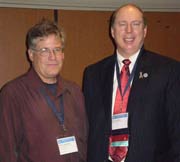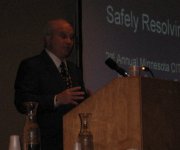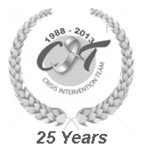The Alchemy Project – Society’s Relationship to the Mentally Ill
Friday October 12, 2007
University of Minnesota School of Music
Ferguson Hall 280

Empowering the arts to
transform our community.
Panelists: Susan Hawthorne, Robin Brown, Mark Anderson
What does it mean to say someone is “mentally ill”? How do we define norms of mental health? How do we treat those classified as suffering from mental illness? What is the relationship between individual chemistry and society as it affects one’s mental health? These and other topics will be addressed in a conversation about society’s relationship to mental illness. The alchemy project is a Twin Cities-based non-profit organization that promotes community engagement through high quality, interdisciplinary arts programming. For more information email: info@alchemyproject.org
3rd Annual national cit conference
August 28-30, 2007
Memphis, Tennessee
BSF joined 1100 other delegates from mental health and criminal justice communities at this national conference. BSF attended the first and second national CIT conference and we were joined by law enforcement, mental health, education and community members from around the state. This year as last year BSF presented at a breakout session on the development of CIT in Minnesota. For more information visit CIT.memphis.edu
 |
 |
| Major Sam Cochran, Memphis Police Department, who is the founder of the CIT (Crisis Intervention Team) Model and Mark Anderson, Executive Director, BSF. | Jan Buntz, BSF Board Member at that time, attended the conference and presented at a breakout session on BSF’s training, collaboration and CIT work in Minnesota. The other BSF presenters were Renee Jenson and Mark Anderson. |
BSF’s Annual Gala, pages of possibilities:
stories that change our lives
July 26, 2007
Carl and Eloise Pohlad Hall, Minneapolis Central Library
Host Roshini Rajkumar of Roshini Multi Media and WCCO Radio. The annual fundraising event featured regional authors and their stories:
- Jim Klobuchar, Minnesota’s well known story teller, explorer, author
- David Housewright, 2002 Shamus Award for best private eye novel
- Anne Frasier, with 18 romantic suspense novels recognized with RITA and Daphne du Maurice awards
- Richard Solly, new published poetry From Where the Rivers Come
- Dorothy McIntyre, who tells the stories of women in sports pre-1940s
- Jodi Davis, tough passages in life in The Heart’s Gift
- Tom Braun of Wild Rumpus Bookstore,
- Norton Stillman of Nodin Press
- Patricia Francisco, poetic memoir of the powerful transformation story, Telling
We honored the wonderful work of our mental health partner from the Combat/Operational Stress Control Team of the 88th Regional Readiness Command, Lt. Col. Susan Whiteaker. Her commitment to members of all branches of the military in the deployment cycle is a true inspiration.
The premiere of our new documentary, Getting it Right, about the CIT model in action. A behind-the-scenes look at the experience of a first responder on the police force under pressure (as well as a person trying to win back his own life). Come and meet the stars of Getting it Right: Police Officer Paul Gillies and other CIT Officers; Charles Jenson; Gloria Freeman; as well as film maker Mike ‘Media Mic’ Hazard.
Hors d’oeuvres, drinks, music, conversation with friends and supporters of our work, with fabulous silent auction items.
Challenged to Provide Healthcare for All
June 21, 2007
Fredrikson & Byron, P.A., Minneapolis U.S. Bank Plaza
Panelists: Kirk Allison, Mark Anderson and Joe Carlile, Congresswoman Betty McCollum’s Office
Basilica Mental Health Fair
May 19-20, 2007
BSF is pleased to co-sponsor the two-day 2nd annual Basilica of Saint Mary Mental Health Fair. Dozens of mental health programs will be represented with literature tables and staff to answer your questions. All are welcome at this event in the lower level of the Basilica of Saint Mary on Hennepin Avenue South in Downtown Minneapolis.
Transforming the mental health system: opportunities and challenges
March 30, 2007
University of St. Thomas, Minneapolis Campus, Opus Hall
Keynote speaker is Pete Early, Author of Crazy: A Father’s Search Through America’s Mental Health Madness. Several panels of local mental health leaders. All details available online at: www.stthomas.edu/education/events
BSF co-sponsored this public policy conference. Attendees agreed to hold a series of brown bag supper meetings to work on follow up to ideas that came out of the day’s discussions. Contact BSF if you would like to be part of this group.
2nd annual MInnesota CIT Conference
February 26, 2007 – Minneapolis Convention Center
|
The theme of the 2nd Annual Minnesota CIT Conference was BUILDING THE TEAM to respond to mental illness in our communities. BSF supports mental health and criminal justice in collaborations across Minnesota. |
 |
These collaboration efforts were explored at the 2nd Annual Minnesota CIT Conference on February 26, 2007, 8:00 a.m.-5:00 p.m. at Minneapolis Convention Center.
The team is needed to support recovery and prevent crisis events for those community members who struggle with a mental illness. In order to provide the support people with mental illness need, family, neighbors and community members need to join the team. If there is a crisis event, police officers, mobile crisis teams and emergency rooms help to stabilize the situation. Inpatient and/or outpatient mental health professionals may also be needed. For those caught up in the criminal justice system, judges, attorneys, court and corrections staff can support the person’s recovery. And support from social services, supportive housing and employment are long term partners that need to be in place as well. Really, the entire community needs to be on the team. They need to understand there is no shame in mental illness. It is simply a health care challenge affecting the brain. And the entire community needs to support the recovery of those who have an illness.
We have all learned to be supportive of a person struggling with cancer or heart disease. People with mental illness need that kind of support, every day too, from all of us. BSF is encouraging the development and strengthening of collaboration among all the team members in local communities.
Here are 2 examples of collaborations that are developing
in their own communities.
Ramsey County Collaboration
Leaders from the criminal justice and mental health institutions in Ramsey County have worked with community partners to develop some exciting work to improve response to mental health crisis and to provide support designed to avert crisis events. There is a very long list of successful efforts but here are a few of the key pieces. An ongoing Mental Health/Police Roundtable that is open to the mental health community and involves discussion of issues that arise involving mental health and the criminal justice system. In addition, providers and police in the St. Paul Downtown Patrol have developed their own Police/Provider Forum to focus on their work Downtown. Joint leadership by police and mental health leaders, in both the Roundtable and the Forum has proved to be essential. Ramsey County has developed a Mental Health Court that diverts offenders whose primary problem is their mental illness and uses the court as a tool to get them the help they need. The Local Adult and Juvenile Advisory Councils have worked with partners at the County and City level to develop a who series of initiatives aimed at addressing emerging problems and focusing on areas that need more work.
Phillips Neighborhood Collaboration
BSF is initiating discussions with community members and partner institutions in an effort to strengthen collaboration in the Phillips Neighborhood near Downtown Minneapolis. Plans are underway to convene partners from the criminal justice and mental health systems along with leaders in the American Indian community, the communities of color, immigrant communities, and any interested residents of the area. The goal will be to identify what is working and to improve access to these community resources. This will be a round-table process where all voices will be invited and respected. The round-table will identify areas where existing programs can be strengthened and improved, where public education can increase use of available resources and where training of community members and staff can raise awareness of the obstacles that exist to access to care and ways those obstacles can be overcome.
 Over 200 in attendence Over 200 in attendence |
 Attendees from 24 counties included 14 police and sheriff departments, courts, corrections, health, mental health, social service providers and consumers Attendees from 24 counties included 14 police and sheriff departments, courts, corrections, health, mental health, social service providers and consumers |
 Keynote speaker Dr. Joel Dvoskin Keynote speaker Dr. Joel Dvoskin |
 Breakout sessions on what’s working in Minnesota and by region to develop multidisciplinary collaborations Breakout sessions on what’s working in Minnesota and by region to develop multidisciplinary collaborations |






